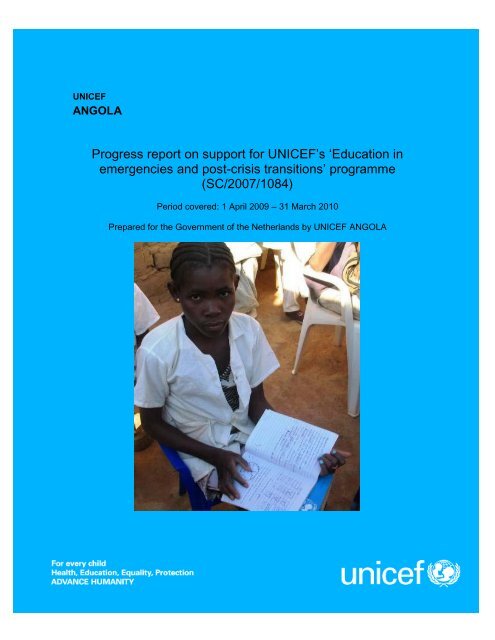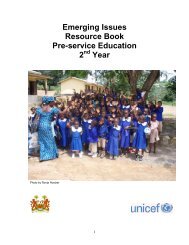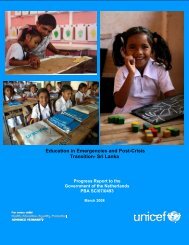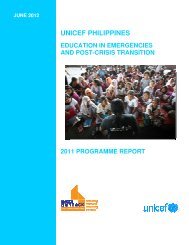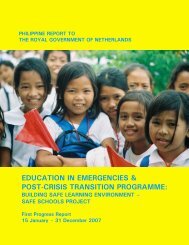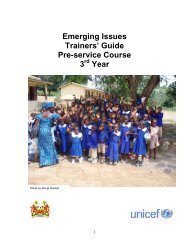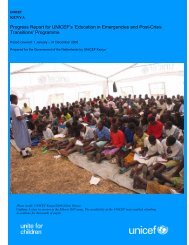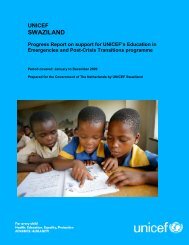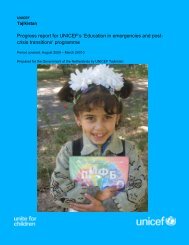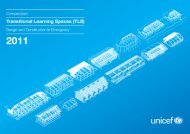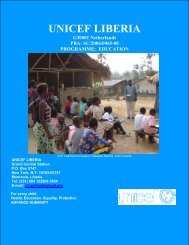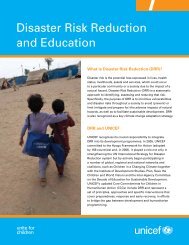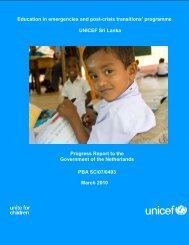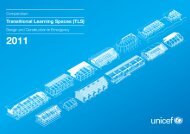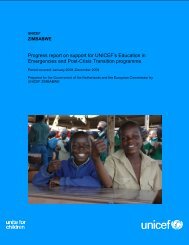Angola Progress Report 2009
Angola Progress Report 2009
Angola Progress Report 2009
You also want an ePaper? Increase the reach of your titles
YUMPU automatically turns print PDFs into web optimized ePapers that Google loves.
UNICEF<br />
ANGOLA<br />
<strong>Progress</strong> report on support for UNICEF’s ‘Education in<br />
emergencies and post-crisis transitions’ programme<br />
(SC/2007/1084)<br />
Period covered: 1 April <strong>2009</strong> – 31 March 2010<br />
Prepared for the Government of the Netherlands by UNICEF ANGOLA
CONTENTS<br />
I. EXECUTIVE SUMMARY ................................................................................... 3<br />
II. PURPOSE ........................................................................................................ 5<br />
III. RESOURCES .................................................................................................. 6<br />
IV. RESULTS ........................................................................................................ 7<br />
V. FUTURE WORK PLAN .................................................................................. 13<br />
VI. FINANCIAL IMPLEMENTATION ................................................................... 14<br />
VII. EXPRESSION OF THANKS ......................................................................... 14<br />
ANNEX ............................................................................................................... 15<br />
LIST OF ACRONYMS ..................................................................................... 15<br />
2
I. EXECUTIVE SUMMARY<br />
Overview<br />
Eight years after the end of the war, social indicators for <strong>Angola</strong> are consistently among the worst<br />
in the world. <strong>Angola</strong> ranks 143 out of 182 countries on the <strong>2009</strong> UNDP Human Development<br />
Index; life expectancy is one of the lowest in the world; the under-5 child mortality rate represents<br />
one of the highest in Africa; 35 per cent of children suffer chronic malnutrition; and an estimated<br />
68 per cent of <strong>Angola</strong>ns live below the poverty line.<br />
By <strong>2009</strong> only about 40 per cent of the population had access to government health facilities.<br />
National immunization rates are low, and <strong>Angola</strong> remains one of the few countries in the world<br />
where polio has not been eradicated. Less than 50 per cent of the population has access to clean<br />
water, making cholera endemic, and more than 1 million children (over 35 per cent) do not attend<br />
primary school. Birth registration rates remain low, at an estimated 31 per cent, which has serious<br />
implications for access to basic social services, including enrolment in school. The national<br />
HIV/AIDS prevalence rate is estimated at 2.1 per cent. Although this is significantly lower than in<br />
the rest of sub-Sahara Africa, data indicate that the infection rate is growing exponentially. The<br />
impact on children will be increasingly serious, and more attention and resources will be needed<br />
for care and support in addition to prevention interventions.<br />
Recent years, however, have seen rapid economic growth and greater allocations of the State<br />
budget for the social sector. At the end of <strong>2009</strong> Parliament approved a budget for 2010 that will<br />
increase spending by about 50 per cent over the revised <strong>2009</strong> budget. The new budget allocates<br />
28 per cent to social spending, including health and education. With a tripling of education<br />
funding, from $1 billion in 2005 to more than $3.1 billion in <strong>2009</strong>/2010, primary school enrolment<br />
has increased in recent years. Net enrolment rose to 75 per cent in <strong>2009</strong>, and gender parity was<br />
achieved in primary school attendance. However, dropout and repetition rates remain high, at 15<br />
per cent and 29 per cent respectively. Primary school completion rates were only 33.2 per cent.<br />
Another positive sign is growing political momentum for improving basic social services and<br />
making children a priority. This was expressed in a series of high-level National Forums for<br />
Children begun in 2004, adoption of 11 Commitments to <strong>Angola</strong>n Children and creation of an<br />
inter-ministerial National Council for Children (CNAC). The 4th National Forum, held in June, was<br />
a watershed demonstration of nationwide commitment to children followed by concrete<br />
decentralized planning and a biannual national plan of action budgeted for $140 million. This has<br />
wide-ranging implications, especially in terms of advocacy, policy development, budgeting and<br />
monitoring of the situation of children. It also represents a key milestone on the path towards<br />
achieving the Millennium Development Goals and enormous potential to dramatically improve the<br />
situation of <strong>Angola</strong>n children.<br />
Although lack of recent valid, reliable, disaggregated data constrains analysis, planning and<br />
implementation of development programmes in all sectors, UNICEF is helping to correct the<br />
information deficit. It is supporting the National Institute for Statistics to analyse a joint Multiple<br />
Indicator Cluster Survey on Household Incomes and Expenditure, conducted in 2008, to update<br />
socio-demographic and economic data. UNICEF is also championing the strengthening of routine<br />
data collection systems under the Indicators for <strong>Angola</strong>n Children, which will assist in monitoring<br />
the 11 Commitments.<br />
Results Achieved<br />
In 2007, UNICEF <strong>Angola</strong> received funds granted by the Netherlands under the programme to<br />
improve education responses and interventions in emergencies and post-crisis transition<br />
countries. These funds have supported four broad programme objectives:<br />
3
Objective 1: Improved quality of education response in emergencies and post-crisis transitions;<br />
Objective 2: Increased resilience of education service delivery (that also reduces the risks of<br />
slippage and promotes turnaround) in chronic crises, arrested development and deteriorating<br />
contexts;<br />
Objective 3: Increased education sector contribution to better prediction, prevention and<br />
preparedness for emergencies due to natural disasters and conflict;<br />
Objective 4: Evidence-based policies, efficient operational strategies and fit-for-purpose financing<br />
instruments for education in emergencies and post crisis situations.<br />
During the reporting period, funds from the Netherlands contributed to achievement of the<br />
following specific results under Objectives 1, 2 and 4:<br />
Objective 1<br />
‣ Enhanced implementation of the Accelerated Learning (AL) programme through partnerships<br />
with IBIS and Save the Children, with significantly increased attention to girl students through<br />
sensitization of communities/parents and mobilization of female teachers as a model for girls.<br />
‣ Better understanding of the importance of girls’ education among key stakeholders<br />
(education officials at central and local level, school directors and teachers) through gender<br />
forums conducted at provincial and municipal level in five provinces (Luanda, Huila, Malange,<br />
Lunda Sul and Kwanza Sul).<br />
Objective 2<br />
‣ Procurement of 176 early childhood development (ECD) emergency kits, with distribution in<br />
process to the five UNICEF focus provinces (Luanda, Cunene, Huila, Bie and Moxico) plus<br />
two others (Huambo and Malanje).<br />
Objective 4<br />
‣ Advancement of evidence-based policy and strategy development in ECD, primary education<br />
(child-friendly schools) and learning achievement assessment:<br />
• A comprehensive, inter-ministerial approach towards ECD was agreed by the Ministry of<br />
Social Assistance (MINARS) and Ministry of Education (MED) to achieve a common<br />
national policy and strategic plan for ECD. The evidence-based development process<br />
was supported through assessment of quality and access, development of an ECD<br />
database and support for training of Ministry staff.<br />
• An integrated, inter-sectoral approach to primary education was advanced in developing<br />
the national child-friendly schools (CFS) framework. A field study conducted in five focus<br />
provinces, complemented by feedback from a workshop, ensured that the process was<br />
based on evidence.<br />
• A systematic monitoring and evaluation mechanism was developed and piloted to<br />
measure children’s learning achievements at primary level. The results are to be reflected<br />
in national policies and strategies.<br />
A strategic shift was made in the education component of the new country programme (<strong>2009</strong>-<br />
2013), placing more emphasis on UNICEF work at the policy level. The activities supported by<br />
the Netherlands in <strong>2009</strong> were therefore expanded beyond those indicated in the original plan,<br />
4
which emphasized implementation of teacher training. Since this was covered by other funding<br />
sources, the Netherlands’ funds were concentrated on the policy work, which directly contributes<br />
to programme objectives 1 (improved quality of education response) and 4 (evidence-based<br />
policies) as well as to the country’s priorities.<br />
II. PURPOSE<br />
The education programme will contribute to the targets of the 11 Commitments for Children;<br />
Millennium Development Goals 2, 3 and 6; and UNDAF outcome 2; and it will support partners in<br />
reaching the following outcomes in at least 16 target municipalities by 2013:<br />
• Thirty per cent of children under age 5 are participating in an ECD programme or initiation<br />
class;<br />
• More than 90 per cent of primary-school-age children are attending certified child-friendly<br />
schools;<br />
• Net enrolment rates have risen to more than 90 per cent, gender disparity has been reduced<br />
by 80 per cent in enrolment and attendance, and retention has improved to more than 90 per<br />
cent;<br />
• All municipalities have budgeted education plans that increase resources for primary<br />
education;<br />
• ‘Second chance’ education has sufficient capacity to fulfil at least 50 per cent of demand;<br />
• HIV sero-prevalence among youth (12-25 years old) has been reduced by 2 per cent.<br />
To achieve these targets, the UNICEF education programme is divided into three<br />
subcomponents:<br />
The Quality Education subcomponent includes advocacy for inclusion of children who are out of<br />
school and for increasing equality in educational opportunities; creation of essential conditions for<br />
learning through technical assistance to improve quality education and increase learning levels,<br />
including setting standards for school construction; improvement of education management at the<br />
school, municipal and provincial levels, within the context of decentralization and increased<br />
budgets; and support for an updated and accurate statistical system for monitoring education<br />
indicators.<br />
The Early Childhood Education subcomponent will increase the number of children accessing<br />
community-based early learning activities and will mobilize communities to implement proven<br />
models for sustainable early childhood education.<br />
The HIV Prevention subcomponent will ensure that 80 per cent of school children aged 13 to 15<br />
and 50 per cent of out-of-school children aged 13 to 18 will be equipped with knowledge and<br />
skills to prevent HIV infection.<br />
The main implementing partners include MED, MINARS, Ministry of Youth and Sports, Ministry of<br />
Health, National Institute to Combat AIDS, National Commission for De-mining and Humanitarian<br />
Assistance and National Civil Protection Service; Provincial Directorates of Education, Health,<br />
Assistance and Social Reintegration; the <strong>Angola</strong>n Football Federation and Basketball and<br />
Handball Associations; national and international non-governmental organizations (NGOs); and<br />
faith-based and community-based organizations.<br />
The main strategic partners include the European Commission; United Nations agencies (World<br />
Food Programme and World Health Organization, as well as partial links with International<br />
Organization for Migration, United Nations Development Programme and United Nations<br />
Educational, Scientific and Cultural Organization), plus <strong>Angola</strong>’s Red Cross.<br />
5
III. RESOURCES<br />
In addition to funding from the Government of the Netherlands, funding for <strong>2009</strong> has mainly come<br />
from the European Commission, the Governments of Japan and Norway, and the German<br />
Committee for UNICEF.<br />
All resources (<strong>2009</strong>) Donor PBA Total<br />
Regular resources UNICEF GC/2008/0030-01 499,378.56<br />
Norway SC/2005/0507-01 571,751.58<br />
Norway SC/2006/0339-01 71,805.75<br />
BASIC EDUCATION AND<br />
GENDER EQUALITY<br />
SC/2006/9901-52 821,774.67<br />
HIV-AIDS AND CHILDREN SC/2006/9903 50,000.00<br />
German Committee for UNICEF SC/2007/0584 642,993.44<br />
United States Fund for UNICEF SC/2007/0994 119,583.47<br />
Netherlands SC/2007/1084 523,744.16<br />
Polish Committee for UNICEF SC/2008/0016 30,961.46<br />
Other resources<br />
Japan SC/2008/0020 771,558.36<br />
Spanish Committee for UNICEF SC/2008/0190 225,999.79<br />
Italian Committee for UNICEF SC/2008/0429 280,070.64<br />
Consolidated Funds, National<br />
Committees<br />
SC/2008/0491 55,602.51<br />
United States Fund for UNICEF SC/2008/0578 12,227.95<br />
European Commission SC/2008/0960 2,963,783.23<br />
Norwegian Committee for UNICEF SC/<strong>2009</strong>/0061 375,081.39<br />
German Committee for UNICEF SC/<strong>2009</strong>/0369 95,857.26<br />
Australian Committee for UNICEF SC/<strong>2009</strong>/0524 49,200.00<br />
Other major<br />
resources<br />
Spain XI/2008/0045-00 115,421.86<br />
Total funding available<br />
from all sources (<strong>2009</strong>)<br />
$8,276,796.08<br />
6
IV. RESULTS<br />
The achievements during <strong>2009</strong>-2010 through the various education activities have contributed to<br />
the following three programme objectives specified in the proposal:<br />
Objective 1: Improved quality of education response in emergencies and post-crisis<br />
transitions through supporting: Accelerated Learning Programme<br />
Issue<br />
Children are always the hardest hit individuals in times of war. Due to the prolonged civil war in<br />
<strong>Angola</strong>, the majority of the population missed several years of schooling or never received any<br />
education at all. Children born in the 1990s, who are now 13 to 18 years old, are suffering the<br />
greatest impact – they are too old to attend primary school, and even if they could, attaining a<br />
basic level of education would generally require six more years of schooling. Many of them would<br />
therefore be in their 20s at graduation.<br />
Action<br />
UNICEF is enhancing its support for reaching out to this population through the MED Accelerated<br />
Learning Programme in selected provinces. The programme aims to provide an accelerated<br />
second-chance opportunity for 25,000 adolescents to acquire literacy, numeracy and life skills<br />
each year through a condensed primary school curriculum, adapted to their needs, that can be<br />
completed in two and a half years – less than half the time needed for the full primary school<br />
cycle. It thus encourages out-of-school adolescents to come back into the school system,<br />
complete primary education and continue on to secondary school.<br />
A specially designed curriculum, training modules and a monitoring system were developed with<br />
UNICEF technical support to facilitate programme implementation. UNICEF has supported<br />
training for supervisors and teachers on teaching methodologies and monitoring tools,<br />
establishment of a database for student registration, provision of student learning kits and support<br />
to implement the programme through partnership with NGOs.<br />
In <strong>2009</strong>, with financial support from the Government of the Netherlands, a new partnership was<br />
agreed with two leading international NGOs (IBIS and Save the Children) to implement the AL<br />
programme as a pilot in 12 municipalities in Kwanza Sul province. A total of 6,889 adolescents<br />
were enrolled, and 4,500 stationery kits and 7,000 modules (teaching and learning materials)<br />
were distributed. The General Education Department leads implementation, while activities are<br />
coordinated and developed by the provincial Directorate of Education coordination team. Both<br />
SCiA and IBIS support implementation of trainings, supervision, logistics and local development<br />
at municipal level.<br />
Six trainings for supervisors were conducted<br />
with UNICEF technical support, resulting in<br />
69 trained supervisors in seven provinces<br />
(Malanje, Moxico, Cunene, Huila, Kwanza<br />
Sul, Bie and Luanda). Twelve training<br />
sessions in five provinces (Malanje, Kwanza<br />
Sul, Cunene, Moxico and Luanda) reached<br />
500 teachers. These trained teachers and<br />
supervisors are expected to support other<br />
teachers in their communities to reinforce<br />
the network of literacy trainers under the AL<br />
programme.<br />
AL classroom in Amboim<br />
7
Improving educational opportunities for girls received considerable attention in the AL programme<br />
through community involvement and mobilization of parents and female teachers as a model for<br />
girls. The gender study has demonstrated the importance of girls’ education to Ministry officials,<br />
school directorates and teachers. UNICEF supported the Government to disseminate the results<br />
of the gender study in five provinces and conducted community forums on gender disparities in<br />
schools.<br />
Impact<br />
The Accelerated Learning programme has had impressive results by:<br />
• Enrolling nearly 7,000 adolescents and out-of-school youth, providing them with an<br />
invaluable opportunity to ‘catch up’ on their education. In line with the UNICEF emphasis<br />
on gender equality, special attention was paid to ensuring the participation of girls. As a<br />
result, girls make up 38 per cent of the students in the AL programme;<br />
• Promoting post-primary educational opportunities, especially for girls, who have a low<br />
rate of transition to secondary education. Of all the adolescents enrolled in the AL<br />
programme, 81 per cent completed primary education.<br />
Objective 2: Increased resilience of education service delivery in chronic crises, arrested<br />
development and deteriorating contexts through supporting: Provision of Early Childhood<br />
Development Kits<br />
Issue<br />
Many <strong>Angola</strong>n schools are ill-equipped, lacking relevant, quality teaching and learning materials.<br />
This hampers teachers’ ability to teach effectively, affecting student learning. This situation is<br />
exacerbated in emergencies, when teachers often have no educational materials at all. Basic<br />
learning kits are distributed to makeshift schools for use during emergencies, such as flooding,<br />
when children can’t get to their school.<br />
Action<br />
A total of 176 ECD emergency kits were purchased. Though delays were experienced in<br />
delivering the kits, they will be received for the 2010 academic year. Plans call for distribution of<br />
the kits as follows: Luanda, 27 per cent; Huila, 22 per cent; Moxico, 9 per cent; Bié, 9 per cent;<br />
Cunene, 7 per cent; Huambo, 6 per cent; and Malange, 6 per cent. Fourteen per cent will be set<br />
aside as a contingency for emergencies.<br />
Impact<br />
The provision of these ECD kits will help to upgrade the quality of early childhood teaching,<br />
contributing to learning and development of emotional skills. ECD professionals will also have<br />
additional resources to perform their teaching duties.<br />
Objective 4: Evidence-based policies, efficient operational strategies and fit-for-purpose<br />
financing instruments for education in emergencies and post-crisis situations through<br />
supporting: Diagnosis on the Quality and Access of ECD for National Policy Development,<br />
Situation Analysis on Primary Education for CFS Framework, and Learning Achievement<br />
Assessment<br />
Diagnosis on Quality and Access of ECD for National Policy Development<br />
Issue<br />
Data show that over 90 per cent of <strong>Angola</strong>n children entering primary school have not received<br />
any early childhood care or preparation for primary school. ECD is a relatively new concept in<br />
<strong>Angola</strong>, and the country faces limits in both demand for ECD and in supply of high-quality<br />
services. Considerable work is needed in policy development and service delivery, as well as in<br />
8
advocacy to demonstrate how investments made at this critical stage benefit children throughout<br />
their lives.<br />
The social assistance and education<br />
ministries (MINARS and MED) plan to<br />
develop a common national policy and<br />
strategic plan on ECD in partnership with<br />
other line ministries and civil society<br />
stakeholders. This will be based in the CNAC<br />
biannual advocacy plan and will follow<br />
recommendations from the second Forum for<br />
Children in 2005. It is a significant first step for<br />
<strong>Angola</strong> to consolidate the national ECD<br />
system and policies and make them function<br />
within an integrated inter-ministerial<br />
framework. The policy and strategy will<br />
contribute to achieving the Government’s 11<br />
Commitments for Children, particularly Commitment 1, Child Survival (reducing under-5<br />
mortality); Commitment 4, Early Childhood Education and Development (expanded access to<br />
ECD); Commitment 2, Food and Nutritional Security; and Commitment 9, Family Competencies<br />
(emphasizing parents’ understanding of good care practice for children under 5 years old).<br />
Action<br />
To outline the national policy, in <strong>2009</strong> UNICEF supported MINARS and MED to conduct a<br />
‘diagnosis’ of ECD quality and access in <strong>Angola</strong>. A local consultancy firm undertook the study in<br />
about 20 municipalities in Benguela, Uige, Moxico, Huambo and Luanda. The work started in<br />
early February <strong>2009</strong> with a desk review of education legislation and major policy documents,<br />
followed by interviews with major stakeholders at central level to determine their views and plans.<br />
The field work took place from mid-February to mid-April. The preliminary report is being finalized,<br />
and the results will be used to inform the policy process.<br />
UNICEF supports MINARS and MED in drafting a roadmap on ECD national policy to be agreed<br />
and signed by both ministries, in liaison with the CNAC commission in charge of national policies<br />
on early childhood. Coordination meetings started in January 2010, and the ECD policy process<br />
plans were approved and announced at the CNAC plenary on 15 March.<br />
An inter-sectoral working group consisting of line ministries and NGOs is being set up to develop<br />
the policy. First the working group will outline its terms of reference, discuss working methods and<br />
budget, and exchange views with local authorities. The group also plans to hold an ECD<br />
awareness-raising workshop in September 2010. The first drafts of the national policy and action<br />
plan will be submitted to the CNAC Children’s Forum in June 2011 for finalization, after which<br />
approval from the Council of Ministers will be sought.<br />
Impact<br />
This process has promoted participatory inter-sectoral coordination among all stakeholders<br />
working for the well-being of <strong>Angola</strong>n children. In the longer term, it will foster collaboration<br />
among line ministries and NGOs in reviewing legislative frameworks, responsibilities, working<br />
methods, strategies and financial and social approaches. This coordination will also increase<br />
awareness and commitments for provision of quality services for early childhood education and<br />
development.<br />
Using the participatory approach in drafting the ECD public policy and action plan will set the<br />
stage for the process of generating other social policies needed in <strong>Angola</strong>. The results of the ECD<br />
study will further advance efforts to ensure evidence-based policy development.<br />
9
ECD Database<br />
Issue<br />
<strong>Angola</strong> undertook its last official census in 1970, so the country is lacking reliable, up-to-date<br />
statistical data. This obstructs planning and budgeting, evaluation, monitoring and implementation<br />
of public policies and service delivery for early childhood development.<br />
Action<br />
A new ECD database has been finalized and is available at MINARS. Five MINARS staff were<br />
trained to operate the database in December <strong>2009</strong>, and an additional five staff members are to be<br />
trained in 2010. The data collection system was simplified to accommodate unreliable access to<br />
electricity and Internet at provincial level. Information was sent to provincial MINARS offices to<br />
enable collection of statistical data in municipalities and then consolidated at the central level.<br />
Impact<br />
The ECD database was created to assist in drafting national policies and plans for early<br />
childhood development. It is meant to assist in the elaboration of ECD policies and service<br />
delivery, planning, budgeting, evaluation, monitoring and implementation.<br />
Child-Friendly Schools<br />
Issue<br />
The <strong>Angola</strong>n education system was destroyed during the 27-year civil war and, despite<br />
improvements during the 8 years of peace, significant challenges remain, with a net primary<br />
enrolment ratio of only 66% and a primary completion rate of only 35%.<br />
There are many reasons why children do not enrol and remain in school. The major problem is<br />
the lack of adequate school infrastructure and teaching/learning materials, which leads to chronic<br />
overcrowding of classrooms, and poor water and sanitation facilities. In addition, teachers are<br />
often unqualified and thus cannot deliver high-quality education.<br />
The child-friendly schools framework – Escolas Amigas da Crianca – being developed by MED<br />
with UNICEF support aims to tackle the issues of access and quality in a comprehensive and<br />
holistic manner. UNICEF has advocated extensively over the past years to prioritize the<br />
mainstreaming of the integrated CFS approach as part of the country’s education reform.<br />
Improving teaching and learning outcomes is at<br />
the heart of the CFS approach. It focuses on<br />
teachers, striving to make teaching more<br />
relevant, child-centred and effective. This is<br />
coupled with efforts to build the capacity of<br />
school directors, ensure more community<br />
participation and create safe, protective and<br />
healthy schools in which children can reach<br />
their full potential.<br />
Action<br />
To ensure the relevance of the CFS framework,<br />
broad participation has been encouraged during<br />
its development. This has included a study and<br />
two workshops involving key stakeholders at<br />
different levels to define the characteristics of<br />
the <strong>Angola</strong>n CFS model. Financial support from<br />
the Netherlands assists MED, as the lead CFS<br />
partner, in these activities.<br />
10
CFS Study:<br />
In partnership with MED, UNICEF and a Brazilian consultancy firm (Aldeia Global) conducted a<br />
five-month field study in <strong>2009</strong>, covering 15 primary schools in 5 provinces (Luanda, Bie, Cunene,<br />
Huila and Moxico). Its purpose was to collect first-hand information on the views of key CFS<br />
stakeholders. The study involved 1,552 people, including children, school directors, teachers,<br />
clerks, local education authorities, parents and communities. They participated in interviews, filled<br />
out questionnaires and held focus group discussions. Supported by the Netherlands’ funds,<br />
UNICEF provided financial and technical assistance throughout the study, including planning<br />
(study design, study tools development), implementation (field research) and report preparation<br />
(data analysis).<br />
The draft study report was submitted to MED and UNICEF for review in November <strong>2009</strong>. It<br />
presented valuable quantitative and qualitative data and analysis along with a concrete vision for<br />
the CFS model in <strong>Angola</strong>. The results were also presented to senior MED officials in the first<br />
workshop on CFS, held in December <strong>2009</strong> (see details below). The results drew their attention,<br />
contributing to further strengthening their awareness of and commitment to CFS.<br />
The final report, incorporating feedback from MED and UNICEF, was to be launched in March<br />
2010. The CFS national framework will then be finalized and the action plan developed.<br />
CFS Workshops<br />
The December <strong>2009</strong> workshop had the participation of key central-level MED officials, including<br />
the Vice Minister and line department directors. It was the first time in <strong>Angola</strong> that all the line<br />
departments of MED came together to work in a coordinated manner to develop a common CFS<br />
framework. The workshop had two objectives: Raise awareness of CFS by introducing its<br />
principles and identify its key characteristics in the <strong>Angola</strong>n context. Approximately 40 people<br />
attended, and the lively discussions and valuable contributions in group work testified to its<br />
success.<br />
Participants had opportunities to enhance their understanding of CFS and its significance in<br />
education quality improvement within the education reform framework. Good CFS examples from<br />
Mozambique were also shared, and these were found very effective for sensitizing participants.<br />
Primary school students expressed their ideas about a ‘dream’ school’. Group sessions further<br />
facilitated analysis of each of the key CFS principles and allowed participants to explore how they<br />
could be applied in <strong>Angola</strong>. The workshop was concluded with an agreement by all the MED<br />
departments on the steps forward.<br />
The results of the workshop, particularly the inputs into the <strong>Angola</strong>n CFS model, are being further<br />
analysed as input for the draft CFS framework. It was to be presented at a national workshop in<br />
May to be validated by a wide range of participants from throughout the country, including the<br />
Minister and Vice-Ministers of Education as well as directors and key officials from all the MED<br />
line departments, line Ministries, local authorities, school directors, teachers, PTA members,<br />
development partners and civil society representatives.<br />
Funding from the Government of the Netherlands has allowed UNICEF to support these two<br />
workshops, whose significance cannot be overemphasized. The funds enabled a fully<br />
participatory process for developing the framework, which is vital in making the CFS model truly<br />
comprehensive, relevant and responsive to local conditions and needs.<br />
11
Impact<br />
The impact of these activities is enormous.<br />
The CFS study, with its emphasis on<br />
education quality, was one of the first of its<br />
kind in the country. The study identified the<br />
specific challenges <strong>Angola</strong> faces and<br />
supported development of<br />
recommendations for child-friendly<br />
schools, based on qualitative, reliable,<br />
participatory field research. This<br />
information is not otherwise available, and<br />
therefore the study provided unique<br />
insights for defining the CFS model in<br />
<strong>Angola</strong>.<br />
UNICEF will also use the study results to<br />
continue its evidence-based advocacy with<br />
MED to promote CFS and raise awareness<br />
among stakeholders and donors.<br />
In addition the workshops have been found<br />
significant as an awareness-raising tool.<br />
The process strengthened MED officials’<br />
acknowledgement of the importance of<br />
CFS and their commitment to it as the<br />
priority agenda item in the education<br />
reform process. MED line departments<br />
have started moving to improve<br />
coordination to aid this common goal.<br />
Inputs from the first workshop on the<br />
<strong>Angola</strong>n model are also serving as a basis for developing the CFS framework. Once finalized, it<br />
will present a comprehensive picture of the way forward for primary education in <strong>Angola</strong>, directly<br />
contributing to quality improvement in the coming years and supporting achievement of the 11<br />
Commitments for Children, the Millennium Development Goals and Education for All goals.<br />
Learning Achievements<br />
Issue<br />
In 2004 MED started reforming the education system, emphasizing reform of the curriculum and<br />
student assessment. However, the exercise did not address assessment of the quality of the<br />
education system overall.<br />
In 2005 MED issued regulations on student assessment, which include formative and summative<br />
assessments, and defined rules for student transition between curricular cycles (primary<br />
education is divided into three cycles of two years each). All students in grades 2 and 4 take an<br />
exam prepared by the local school board. The law requires all students in grade 6 to take a<br />
national exam. Logistical and communication difficulties in the country have so far prevented this<br />
exam from being given, so in practice the national exam has been replaced by provincial exams<br />
prepared by each province’s Directorate of Education. A similar process is applied to both cycles<br />
of secondary education. Cycle pass rates are determined by a formula encompassing formative<br />
and summative assessment and results from school and provincial exams.<br />
All forms of assessment are regulated by the National Institute for Education Research and<br />
Development, which also has the mandate to develop curricula and assess education quality. The<br />
Institute was to be aided in developing a national learning achievement assessment system.<br />
12
Action<br />
In May <strong>2009</strong> MED established a multi-disciplinary technical group to develop a national learning<br />
achievement assessment system. With technical assistance from UNICEF, the technical group<br />
carried out an analysis of primary school curricula and a diagnostic study of past learning<br />
achievement assessments during May and June <strong>2009</strong>. It highlighted their strengths and<br />
weaknesses and evaluated the capacity to implement the proposed assessment system in MED.<br />
The MED technical group then conducted an inception workshop with policymakers and other<br />
relevant stakeholders. It was designed to clarify the concept of the learning achievement<br />
assessment system, demonstrate how such a system could be developed and illustrate how it<br />
could be used to improve education quality in <strong>Angola</strong>. Between July and November <strong>2009</strong> the<br />
technical group prepared an action plan for development of the assessment system, which was<br />
subsequently approved by MED and other relevant stakeholders. During this period, with financial<br />
support from Russia Education Aid for Development, a delegation led by the Vice Minister of<br />
Education for Education Reform participated in the I READ Global Conference on Learning<br />
Achievement Assessment in Moscow. It was jointly organized by the Russian Federation<br />
Government and the World Bank.<br />
Between November <strong>2009</strong> and March 2010, under the supervision of the MED technical group, a<br />
team of national and international Portuguese language specialists finalized the translation and is<br />
undertaking the adaptation of Early Grade Assessment (EGRA) instruments to the <strong>Angola</strong>n<br />
context. A group of 9 municipalities, 36 schools and 1,080 students from Cunene, Lunda Sul and<br />
Luanda provinces has been selected for the EGRA pilot, which was to take place in April 2010.<br />
Impact<br />
MED decision-makers, managers and other stakeholders are familiar with the concept and<br />
implications of a national learning achievement assessment system, and they support its<br />
development. All 14 members of the MED technical group have a good understanding of the<br />
concept and are committed to it, and to EGRA in particular. Expectations are high among<br />
educators, policy makers and managers regarding the possibilities for the assessment results to<br />
improve education quality throughout the system, including by offering continuous professional<br />
development to teachers.<br />
Lessons learned and constraints<br />
In <strong>2009</strong> UNCEF finally reaped the rewards of previous efforts to advocate for the CFS concept to<br />
be embedded in MED priorities. <strong>Progress</strong> in developing the framework has been slow, due<br />
primarily to limited availability of key MED officials towards the end of <strong>2009</strong>, when most CFS<br />
activities were planned.<br />
<strong>Progress</strong> in developing a roadmap for creation of the national ECD policy has also been slow due<br />
to lack of leadership from the Government (despite clearly articulated political will) and human<br />
resource constraints in the UNICEF education section. Efforts are being accelerated in 2010.<br />
V. FUTURE WORK PLAN<br />
Item<br />
Amount<br />
Continued support to ECD study, policy and training 200,000<br />
CFS framework and promotion (communication) package 90,000<br />
Development and implementation of pilot CFS integrated package in schools 54,000<br />
Continued support to Accelerated Learning programme 40,000<br />
Project monitoring, supervision and support 60,000<br />
Total $444,000<br />
13
VI. FINANCIAL IMPLEMENTATION<br />
The figures below are provisional numbers on financial implementation for the contributions from<br />
the Netherlands Government received from 2007 through March 2010. The amount reflects the<br />
figures available at field office level and should be considered indicative. Actual expenditures are<br />
reflected in the Statement of Accounts prepared by the Division of Financial Management, New<br />
York.<br />
As of the end of <strong>2009</strong>, a total of $1,434,254.42 has been spent of the total contribution of<br />
$1,886,800, representing a utilization rate of 76 per cent. Detailed figures for each of the subcomponents<br />
are provided in the table below.<br />
Activities<br />
Amount spent<br />
2008<br />
Accelerated Learning programme 87,705.58<br />
Teacher training 215,406.31<br />
School health promotion 36,762.15<br />
Provision of basic learning kits 89,422.45<br />
Disaster risk reduction programme in schools 19,153.00<br />
Situation analysis on primary education 27,907.00<br />
Advocacy and programme communications 374.13<br />
Project Support 85,723.62<br />
2008 TOTAL 562,454.24<br />
<strong>2009</strong><br />
Accelerated Learning programme and gender 121,376.35<br />
Provision of ECD kits 55,700.44<br />
ECD diagnosis study and database 31,327.87<br />
CFS framework (study and workshop) 196,693.61<br />
Learning achievement assessment 137,598.40<br />
Project support 206,379.51<br />
<strong>2009</strong> TOTAL 749,076.18<br />
2010 (Jan-March)<br />
Project Support 122,724.00<br />
2010 TOTAL 122,724.00<br />
TOTAL EXPENDITURE 1,434,254.42<br />
TOTAL CONTRIBUTION 1,886,800.00<br />
VII. EXPRESSION OF THANKS<br />
UNICEF would like to take this opportunity to thank the Government of the Netherlands for its<br />
generous support to the education programme in <strong>Angola</strong>. Working in <strong>Angola</strong> is challenging and<br />
expensive, and UNICEF recognizes that it needs to work doubly hard to ensure that it extracts<br />
maximum impact from your contribution. This flexible financial assistance has been crucial in<br />
enabling the education sector to advance key reforms and improve the quality of teaching and<br />
learning in individual schools. UNICEF <strong>Angola</strong> looks forward to continued collaboration on these<br />
fundamental interventions.<br />
14
ANNEXES<br />
LIST OF ACRONYMS<br />
Accelerated Learning (AL)<br />
Child-Friendly Schools (CFS)<br />
Early Childhood Development (ECD)<br />
Early Grade Assessment (EGRA)<br />
Ministry of Education (MED)<br />
Ministry of Social Assistance and Re-integration (MINARS)<br />
National Council for Children (CNAC)<br />
Russia Education Aid for Development (READ)<br />
15


